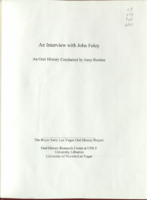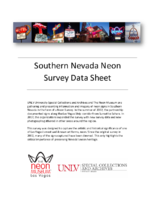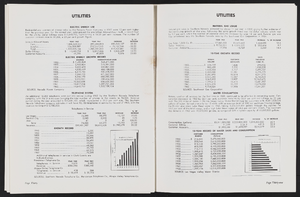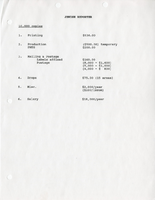Search the Special Collections and Archives Portal
Search Results

Interview with Gracian Uhalde, December 1, 2006
Date
Archival Collection
Description
Text

Transcript of interview with John Foley by Irene Rostine, May 11, 2011
Date
Archival Collection
Description
Text

Lucky Cuss Neon Survey document, September 14, 2017
Date
Archival Collection
Description
Site address: 3305 Fremont St
Sign owner: D B N G LLC
Sign details: This property was originally the Panorama Motel, which opened in the 1950's. However, the signage later changed to fit the Lucky Cuss Motel. It was removed from the property in 2008. In 2012, the old sign was restored by the Neon Museum and placed on Las Vegas Boulevard. The replacement sign is still at the property.
Sign condition: 5 - appears to be well maintained
Sign form: Roadside pole
Sign-specific description: The sign at the property is a rectangular cabinet, with the edges at the top rounded off. The background of the cabinet is red, and the outline is blue. The words "Lucky Cuss" are white in a stylized front, and the word "Motel" in larger, block white lettering. On the side of the cabinet is the address 3305.
Sign - type of display: Neon
Sign - media: Steel
Sign environment: Property is on Fremont St, near a car dealership and other motels
Sign - date of installation: c. 2008
Sign - thematic influences: The sign does keep some of the original elements of the first sign, the 1950s era stylized font and simple outlines of neon.
Sign - artistic significance: The sign, although new, does throwback to the original's 1950s creation date.
Survey - research locations: Assessor's website, roadarch.com
Surveyor: Lauren Vaccaro
Survey - date completed: 2017-09-14
Sign keywords: Neon; Steel; Pole sign; Roadside
Text
James Cashman Sr. Papers
Identifier
Abstract
The James Cashman Sr. Papers date from approximately 1890 to 1969 and contain correspondence, photographs, insurance records, and bank records related to Cashman and his businesses in Southern Nevada. The collection documents the lives of the Cashman family and their businesses in southern Nevada.
Archival Collection
Woodrow Wilson Photograph Collection
Identifier
Abstract
The Woodrow Wilson Photograph Collection consists of black-and-white photographic prints and negatives. The images depict black elected government leaders attending the first Conference of Black Elected Officials held in Washington, D.C. in September 1969. Of particular interest are images of Nevada's first black state legislator, Woodrow Wilson; Georgia state representative, Julian Bond; and President Richard Nixon.
Archival Collection
J. Ross Clark Scrapbook
Identifier
Abstract
The J. Ross Clark Scrapbook dates from approximately 1897 to 1972 and consists of newspaper clippings collected by his wife, Miriam Evans Clark. The clippings relate to professional events in the lives of J. Ross Clark and his brother, Senator William A. Clark. A small number of the clippings refer to births, marriages, and deaths in Miriam Evans and J. Ross Clark's families. Also included are documents written by J. Ross Clark's grand-niece, Dorothy Murdock Dunkley, that offer additional information about the Clark and associated families.
Archival Collection

Transcript of interview with Ruth Annette Mills by Lisa Gioia-Acres, November 20, 2008
Date
Archival Collection
Description
Ruth Annette Mills was born and raised in Washington, D.C. She recalls the early years during WWII, her father's cancer and radium treatment under Blue Cross Blue Shield, his passing when she was nineteen, and her marriage that same year. Ruth and her husband and family lived in Georgia, Texas, and Maryland before coming to Las Vegas in 1968. She worked as a typist for the Office of Education at one point and did volunteer work for her church, the Cub Scouts, and the League of Women Voters. She also worked as a clerk-typist for the Clark County School District, and eventually became a teacher through the Teacher Corps program. She graduated in 1975 and was hired to teach 6th grade at CVT Gilbert. The school integration program was just beginning when Ruth was first hired as a teacher. She held the position of facilitator and recalls how angry parents were when they learned their children had to be bussed to sixth grade centers. Having been involved through her church with the Civil Rights Movement in other states, she was disappointed with the racist attitudes she encountered in Las Vegas. Ruth's involvement with health care began when her daughter-in-law developed kidney stones and was denied treatment. In 1993 she started the Nevada Health Care Reform Project through the League of Women Voters in order to support Bill Clinton's health plan. Fifteen years later, over 100 organizations had come on board to support the League's coalition in favor of Clinton's plan, and her fondest wish is that one day Universal Health Care will be available to all Americans.
Text



